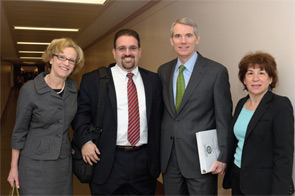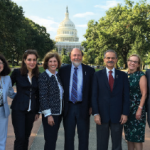
In early March, leading members of Congress and other key policymakers will meet face to face with volunteer leaders of the ACR. The upcoming ACR Advocacy Leadership Conference will take place March 4–6, and will bring together members of the ACR Board of Directors and key committees such as the Government Affairs Committee, RheumPAC Committee, and the Affiliate Society Council to meet with members of Congress to discuss legislative and regulatory issues affecting the rheumatology community. These regular in-person meetings are a fundamental part of the ACR’s overall efforts to impact national healthcare policy in a positive way and to ensure the viability of the rheumatology subspecialty.
Through the ACR Advocacy Leadership Conference, rheumatology leaders can check in personally with members of Congress to reinforce policy requests and emphasize specific policy concerns. Meetings with federal agency leaders and other contributors to the national policy dialogue accompany congressional meetings. During the conference, ACR leaders will address appropriate reimbursement for cognitive specialists, funding for medical research, and patient access to treatments.
Needs of Cognitive Specialists Receive Special Emphasis
Like other cognitive specialties such as neurology and endocrinology, rheumatology’s future is in a precarious position due to continuing reimbursement issues for evaluation and management services and weak recruitment rates, compared with more procedurally focused specialties. The key to the problem facing rheumatology is that its practitioners do not receive the large paychecks of procedural specialists, but they also do not receive the special protections that policymakers are providing primary care providers.
Current fee schedules undervalue cognitive specialty care and endanger the future supply of rheumatologists. Additionally, in an alarming trend, as proposals for reform are developed, influential contributors such as the Medicare Payment Advisory Commission and individual members of Congress are increasingly dividing physicians in order to protect providers such as those in primary care—but grouping cognitive specialties with procedural specialties. The problem with this approach is that the practice climate of cognitive specialists more closely resembles that of primary care than that of proceduralists. Cognitive specialists more often bill the same codes as primary care providers, and have similar recruiting problems and income levels.
The ACR is placing special emphasis with members of Congress on correcting this type of approach. If the intent is to provide a balanced physician workforce, it makes sense to group providers based on services they are providing and codes they are utilizing, rather than on physicians’ self-identification or the “shingle” they hang. Cognitive specialists who manage care for patients with chronic disease often help to prevent hospital stays and costly surgeries. These services improve patient outcomes and decrease costs, and they must be appropriately reimbursed.
As a complement to its ongoing work with policymakers, the ACR is working closely with similar cognitive specialty organizations including the American Academy of Neurology, American Association of Clinical Endocrinologists, The Endocrine Society, the Infectious Diseases Society of America, the North American Neuro-Ophthalmology Society, and the American Academy of Allergy, Asthma, and Immunology. Working together as the Cognitive Specialty Coalition, the organizations collectively represent more than 68,500 physicians across the United States.
Will You Share your Patient Evaluation and Management Story?
The ACR is always in need of stories that can be shared with members of Congress. Specific examples of how you care for your patients—and, in particular, how you manage patients with chronic conditions—are very compelling to members of Congress and increase their understanding of rheumatology’s unique situation. Send your stories to [email protected] or call (404) 633-3777 to speak with ACR government affairs staff. Your involvement makes a very real difference in policy outcomes.


